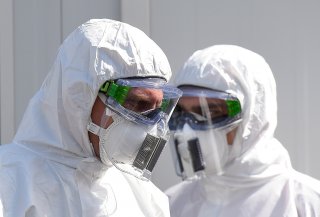The Geopolitical Cost of Battling the Coronavirus Separately (China Will Win)
The United States and Europe must join forces to pursue a united coronavirus campaign, otherwise, China and other competitors will emerge from this crisis substantially more capable of affecting dynamics around the world to the detriment of the transatlantic community.
Second, the United States and EU should formally unite their global coronavirus support activities into a joint campaign. The transatlantic relationship remains the foundation of America’s alliance network. Regardless of differences over trade, Iran, and a number of other issues, the United States and Europe share the same fundamental interests. In the context of the coronavirus pandemic, they undoubtedly possess a common interest to preserve the influence and appeal of the collective West, especially vis-à-vis China and Russia, whose coronavirus diplomacy has been far less dynamic than China’s but is nonetheless present.
Third, where the United States and EU cannot compete symmetrically with China, especially when supplies, equipment, and staff are needed at home, they should compete asymmetrically and based on their comparative advantages. Even when united, the United States and EU cannot match Beijing’s ability to leverage excess supplies and deploy coronavirus-hardened doctors to countries around the world. But coronavirus isn’t just a health crisis. It’s also an economic crisis, a political crisis, and in some sense a security crisis. And this is where the United States and EU can utilize their comparative advantages as dynamic, nimble, and innovative economies founded on private enterprise, as well as countries with pre-existing and multifaceted institutional links to a wide range of governmental and non-governmental actors across the globe.
As such, they could embed experts from the Treasury Department, European Commission, and individual EU governments within local finance ministries or task forces established to coordinate a country’s economic response to coronavirus. Working with local agencies, these experts would recommend specific stimulus measures and offer guidance regarding effective implementation, showing that the United States and EU are already helping countries minimize the economic fallout of the pandemic. In addition to direct engagement at the state level, the U.S. government and its European counterparts should stimulate their private sectors to offer relevant forms of assistance.
American technology companies could, for example, advise countries on launching digital and interactive IT platforms to inform their citizens of the latest anti-coronavirus rules and regulations or how businesses can access stimulus funds. On the security side, the United States, EU, and EU member states should introduce new initiatives to help countries secure their borders, including through an appropriate expansion of intelligence-sharing, and use existing mechanisms, like the National Guard State Partnership Program, to help defense ministries cope with the unique challenges that coronavirus poses to militaries.
Finally, all this must be done in conjunction with an elevated public diplomacy and informational campaign to highlight and describe in detail the support that the United States and Europe are delivering to countries around the world. In addition to genuine humanitarianism, coronavirus assistance is about hearts and minds. Unless these societies are properly informed, minds will stray, and hearts will be lost. But none of this suggests that the United States and Europe should only focus on their good deeds. An effective coronavirus informational campaign must also entail the leveraging of facts to draw attention to the cynicism and exaggerated assistance of others, namely those countries that have a different vision for the post-coronavirus world order and want to see the collective West emerge from the crisis fractured and less influential. It should certainly illuminate China’s months-long coverup of coronavirus and how countries could have used this time to prepare for the pandemic had Beijing been honest. The informational drive should point out the many instances in which defective Chinese medical supplies and equipment have been delivered, which has cost lives. All this is more than fair game.
At the expense of their own shared interests, the United States and Europe are going to be far less effective if they continue their global coronavirus support efforts independently. They must join forces to pursue a united coronavirus campaign, otherwise, China and other competitors will emerge from this crisis substantially more capable of affecting dynamics around the world to the detriment of the transatlantic community.
Daniel P. Vajdich is a non-resident senior fellow at the Atlantic Council. He was lead staffer for Europe and Eurasia on the Senate Foreign Relations Committee and has been a national security advisor to numerous Republican presidential campaigns.
Image: Reuters.

